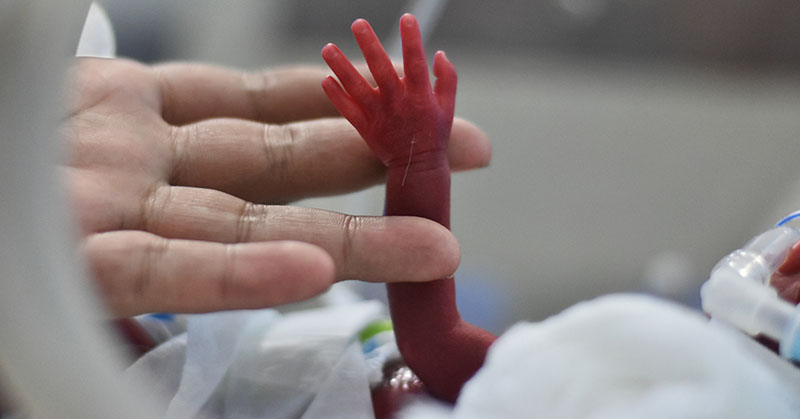Infants operated on before discharge had more adverse events than those with later surgery

It may be better for preterm infants to wait to perform hernia surgery until after they have been discharged from the newborn intensive care unit, suggests a study funded by the National Institutes of Health (NIH). Infants who underwent surgery for inguinal hernia—when intestinal tissue protrudes through an abnormal opening in the abdominal muscles—after discharge had fewer adverse events than those who had surgery while still in the hospital. The finding offers guidance on the safest timing of an essential procedure for a class of fragile infants.
The study was conducted by Martin Blakely, M.D., of the University of Texas Health Sciences Center in Houston, and colleagues. It appears in the Journal of the American Medical Association. Funding was provided by NIH’s Eunice Kennedy Shriver National Institute of Child Health and Human Development.
Background
Inguinal hernia occurs when the contents of the abdomen bulge through an abnormal opening in the lower abdominal wall. The abdominal contents protrude through one of two passages, called inguinal canals, located in the groin on both sides of the body. The contents of the inguinal hernia (usually intestine) may become stuck and can’t be massaged back into the abdomen. Males are more likely to develop a hernia than females. Early preterm infants have the greatest hernia risk, reaching 40% in males born at 24 weeks of pregnancy. The condition usually requires surgery, which involves pushing the protruding tissue back into the abdomen and closing the abnormal opening. In older children, this operation is less challenging, but in preterm infants, the operation requires careful planning from multiple groups of physicians.
Previous research on whether to perform the surgery early or late is inconclusive, according to the study authors. Early surgery may further weaken preterm infants with existing health issues, but delaying surgery may lead to complications from the hernia.
Results
For the current study, researchers enrolled preterm infants from 39 institutions around the United States. All infants had an inguinal hernia and were born before 37 weeks of pregnancy. Infants were randomly assigned to have surgery before discharge from the neonatal intensive care unit or after discharge, when they reached approximately 15 weeks of age (corrected for prematurity). Infants were randomized approximately two weeks before their anticipated discharge, typically when decisions on the timing of inguinal hernia surgery are made. Some exceptions were made for medical or family reasons.
Researchers compared the number of infants in each group that had at least one serious adverse event. These included serious lung and breathing problems, cardiac events, surgical complications, complications related to the hernia, and death.
Of the 159 infants in the early repair group, 44 (28%) had at least one serious event during the 10-month observation period. In the late repair group, 27 (18%) of 149 infants had a serious adverse event.
Significance
The authors noted that fewer infants in the late repair group had at least one serious adverse event and concluded that their findings support delaying surgery to repair inguinal hernia in preterm infants until after they are discharged from the intensive care unit.
Reference
Blakely ML, et al. Effect of early vs late inguinal hernia repair on serious adverse event rates in preterm infants: A randomized clinical trial. Journal of the American Medical Association. 2024.

 BACK TO TOP
BACK TO TOP